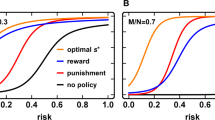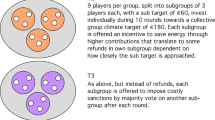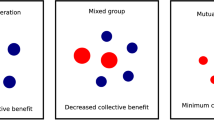Abstract
The difficulty of avoiding dangerous climate change arises from a tension between group and self-interest1,2,3 and is exacerbated by climate change’s intergenerational nature4. The present generation bears the costs of cooperation, whereas future generations accrue the benefits if present cooperation succeeds, or suffer if present cooperation fails. Although temporal discounting has long been known to matter in making individual choices5, the extent of temporal discounting is poorly understood in a group setting. We represent the effect of both intra- and intergenerational discounting4,6,7 through a collective-risk group experiment framed around climate change. Participants could choose to cooperate or to risk losing an additional endowment with a high probability. The rewards of defection were immediate, whereas the rewards of cooperation were delayed by one day, delayed by seven weeks (intragenerational discounting), or delayed by several decades and spread over a much larger number of potential beneficiaries (intergenerational discounting). We find that intergenerational discounting leads to a marked decrease in cooperation; all groups failed to reach the collective target. Intragenerational discounting was weaker by comparison. Our results experimentally confirm that international negotiations to mitigate climate change are unlikely to succeed if individual countries’ short-term gains can arise only from defection.
This is a preview of subscription content, access via your institution
Access options
Subscribe to this journal
Receive 12 print issues and online access
$209.00 per year
only $17.42 per issue
Buy this article
- Purchase on Springer Link
- Instant access to full article PDF
Prices may be subject to local taxes which are calculated during checkout



Similar content being viewed by others
References
Hardin, G. The tragedy of the commons. Science 162, 1243–1248 (1968).
Dawes, R. M. Social dilemmas. Annu. Rev. Psychol. 31, 169–193 (1980).
Hauert, C., Michor, F., Nowak, M. & Doebeli, M. Synergy and discounting of cooperation in social dilemmas. J. Theor. Biol. 239, 195–202 (2006).
Schelling, T. C. Intergenerational discounting. Energy Policy 23, 395–401 (1995).
Clark, C. The economics of overexploitation. Science 181, 630–634 (1973).
Sumaila, R. & Walters, C. Intergenerational discounting: A new intuitive approach. Ecol. Econom. 52, 135–142 (2005).
Beckerman, W. & Hepburn, C. Ethics of the discount rate in the Stern review on the economics of climate change. World Econom. 8, 187–210 (2007).
Schneider, S. H. What is ‘dangerous’ climate change? Nature 411, 17–19 (2001).
Meinshausen, M. et al. Greenhouse-gas emission targets for limiting global warming to 2 °C. Nature 458, 1158–1162 (2009).
Peters, G.P. et al. The challenge to keep global warming below 2 °C. Nature Clim. Change 3, 4–6 (2013).
Roeckner, E., Giorgetta, M. A., Crueger, T., Esch, M. & Pongratz, J. Historical and future anthropogenic emission pathways derived from coupled climate-carbon cycle simulations. Climatic Change 105, 91–108 (2011).
Fehr, E. & Gächter, S. Altruistic punishment in humans. Nature 415, 137–140 (2002).
Gächter, S., Renner, E. & Sefton, M. The long-run benefits of punishment. Science 322, 1510 (2008).
Milinski, M., Semmann, D. & Krambeck, H. J. Reputation helps solve the ‘tragedy of the commons’. Nature 415, 424–426 (2002).
Rockenbach, B. & Milinski, M. The efficient interaction of indirect reciprocity and costly punishment. Nature 444, 718–723 (2006).
Jacquet, J., Hauert, C., Traulsen, A. & Milinski, M. Shame and honour drive cooperation. Biol. Lett. 7, 899–901 (2011).
Bagnoli, M. & McKee, M. Voluntary contribution games: Efficient private provision of public goods. Econ. Inquiry 29, 351–366 (1991).
Milinski, M., Sommerfeld, R., Krambeck, H. J., Reed, F. A. & Marotzke, J. The collective-risk social dilemma and the prevention of simulated dangerous climate change. Proc. Natl Acad. Sci. USA 105, 2291–2294 (2008).
Milinski, M., Röhl, T. & Marotzke, J. Cooperative interaction of rich and poor can be catalyzed by intermediate climate targets: A letter. Climatic Change 109, 807–814 (2011).
Tavoni, A., Dannenberg, A., Kallis, G. & Löschel, A. Inequality, communication, and the avoidance of disastrous climate change in a public goods game. Proc. Natl Acad. Sci. USA 108, 11825–11829 (2011).
Fisher, B. S. et al. in Climate Change 2007: Mitigation (eds Metz, B., Davidson, O. R., Bosch, P. R., Dave, R. & Meyer, L. A.) 170–250 (Cambridge Univ. Press, 2007).
Stevens, J. R. & Stephens, D. W. in Impulsivity: The Behavioral and Neurological Science of Discounting (eds Madden, G. J. & Bickel, W. K.) 361–387 (APA, 2009).
McClure, S. M., Laibson, D., Loewenstein, G. & Cohen, J. D. Separate neural systems value immediate and delayed monetary rewards. Science 306, 503–507 (2004).
Frederick, S., Loewenstein, G. & O’Donoghue, T. Time discounting and time preference: A critical review. J. Econom. Lit. XL, 351–401 (2002).
Milinski, M., Semmann, D., Krambeck, H. J. & Marotzke, J. Stabilizing the Earth’s climate is not a losing game: Supporting evidence from public goods experiments. Proc. Natl Acad. Sci. USA 103, 3994–3998 (2006).
Pan, Y. et al. A large and persistent carbon sink in the world’s forests. Science 333, 988–993 (2011).
Hilbe, C., Abou Chakra, M., Altrock, P. M. & Traulsen, A. The evolution of strategic timing in collective-risk dilemmas. PLoS ONE 8, 1–6 (2013).
Acknowledgements
We thank the students from the University of Hamburg for participation, the students at the University of British Columbia for participation in pilot experiments, T. Burmester, S. Dobler, R. Reilly for their help and the Max-Planck-Society and the Natural Sciences and Engineering Research Council of Canada for financial support.
Author information
Authors and Affiliations
Contributions
J.J., C.H. and M.M. designed the experiment; K.H. and M.M. carried out the experiments; T.R. wrote the software for performing the experiment; J.J., K.H. and T.R. prepared the data and statistics; all authors wrote the paper, prepared the figures, and reviewed the paper and results.
Corresponding author
Ethics declarations
Competing interests
The authors declare no competing financial interests.
Supplementary information
Rights and permissions
About this article
Cite this article
Jacquet, J., Hagel, K., Hauert, C. et al. Intra- and intergenerational discounting in the climate game. Nature Clim Change 3, 1025–1028 (2013). https://doi.org/10.1038/nclimate2024
Received:
Accepted:
Published:
Issue Date:
DOI: https://doi.org/10.1038/nclimate2024
This article is cited by
-
Information about historical emissions drives the division of climate change mitigation costs
Nature Communications (2023)
-
Is a Rational Politics of Disaster Possible? Making Useful Decisions for Others in an Experimental Disaster Game
Political Behavior (2023)
-
Leveraging social cognition to promote effective climate change mitigation
Nature Climate Change (2022)
-
Evolution of prosocial behaviours in multilayer populations
Nature Human Behaviour (2022)
-
Forward-Looking Belief Elicitation Enhances Intergenerational Beneficence
Environmental and Resource Economics (2022)



